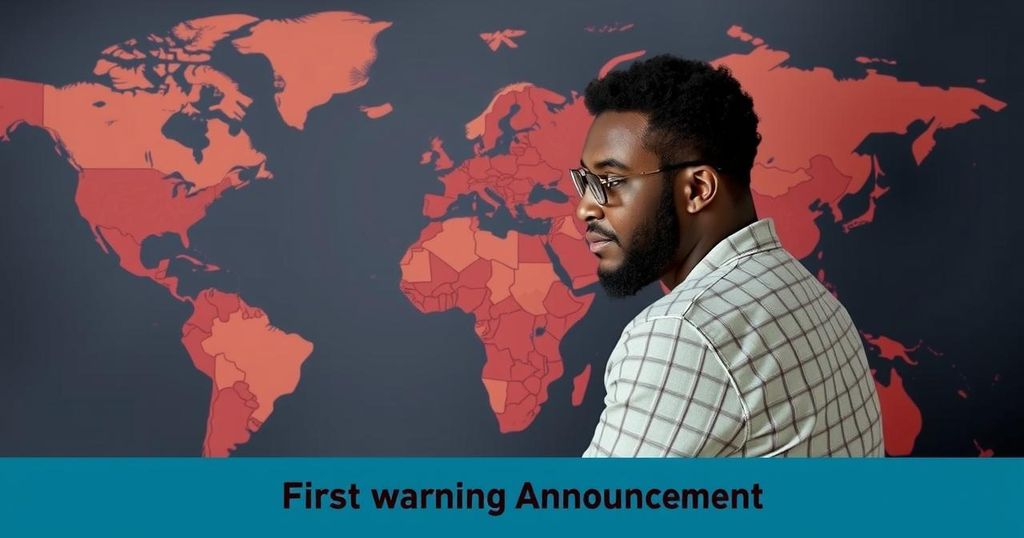Chad has published its first Common Alerting Protocol (CAP) Warning and initiated international data sharing, marking a significant enhancement in its climate resilience and early warning systems. Supported by the World Meteorological Organization (WMO), the achievement follows a year of modernization efforts and aims to set a precedent for other nations in improving meteorological services. Chad is now transmitting real-time data from its Automatic Weather Stations (AWS) to global systems, addressing key challenges related to weather data accessibility and compatibility.
Chad has achieved a remarkable milestone by publishing its first Common Alerting Protocol (CAP) Warning, thereby commencing international data sharing as of October 2024. This development marks a significant leap in enhancing Chad’s climate resilience and early warning systems. The initiative underscores the transformative impact that digital tools and capacity-building programs can have on overcoming the historical challenges faced by National Meteorological and Hydrological Services (NMHSs) in Africa.
As of January 2024, approximately 60% of NMHSs in Africa did not possess a functional website, and around 30% had no online presence at all. Alarmingly, nearly 37% of these agencies had not issued any weather warnings over the preceding six months. The majority of Automatic Weather Stations (AWS) across the continent were unable to transmit data to global centers due to fragmented systems and software compatibility issues, severely hindering their ability to provide vital weather and climate information to vulnerable populations.
In response to these challenges, the World Meteorological Organization (WMO) has collaborated with Chad’s meteorological agency, Agence Nationale de la Météorologie – Météo Tchad (ANAM), over the past year. This partnership focused on modernizing ANAM’s digital presence, improving communication strategies, enhancing data visualization for impact-based forecasting, and upgrading its observation network for real-time data sharing.
The culmination of these efforts was marked by a mission to Chad from October 14 to 18, 2024, funded by the Climate Risk and Early Warning Systems (CREWS) Initiative. This mission represented the final phase of a year-long technical assistance program supported by WMO and NORCAP, which included comprehensive training throughout the climate information value chain. During this mission, Chad successfully issued its inaugural CAP warnings, initiating international data exchange—an essential step for the nation’s early warning services and its contributions to global weather data systems.
Chad is now actively transmitting real-time data from 19 AWS through the WMO Information System (WIS2.0), significantly enhancing global weather forecasts and supporting international climate monitoring. Prior to this initiative, none of Chad’s 59 AWS stations contributed to global data sharing, indicating substantial progress in addressing system fragmentation and software incompatibility. This advancement serves as a model for other African nations.
Chad’s remarkable transformation is supported by innovative open-source tools developed by WMO, including ClimWeb, which aids in the dissemination of climate services; CAP Composer, an intuitive platform for creating and communicating alerts; and the WIS2Box Automated Data Loader, facilitating seamless integration of AWS data into WIS2Box for global sharing.
This success is a part of a broader digital transformation initiative orchestrated by WMO and NORCAP, establishing a model for other African countries to adopt similar technological solutions. By addressing issues such as AWS interoperability and improving the delivery of climate services, NMHSs across Africa can bolster climate resilience and contribute to a safer, more sustainable future for all.
The article discusses Chad’s significant achievement in advancing its climate resilience and early warning systems through the publication of its first Common Alerting Protocol (CAP) Warning and the commencement of international data sharing. This initiative aims to address long-standing challenges faced by National Meteorological and Hydrological Services (NMHSs) in Africa, which have struggled with inadequate digital infrastructure and communication systems. The collaboration between the World Meteorological Organization (WMO) and Chad’s meteorological agency over the past year has been crucial in facilitating this transformation, demonstrating the potential of digital tools in enhancing climate services.
In conclusion, Chad’s recent milestone of publishing its first CAP Warning and starting international data sharing demonstrates a significant advancement in its climate resilience capabilities. Through collaborative efforts with WMO and leveraging open-source technological tools, Chad has made considerable progress in its meteorological services, setting a positive example for other African nations. This transformative initiative not only empowers Chad to deliver timely weather information to its population but also contributes to the global data systems that enhance international climate monitoring and forecasting.
Original Source: www.preventionweb.net






